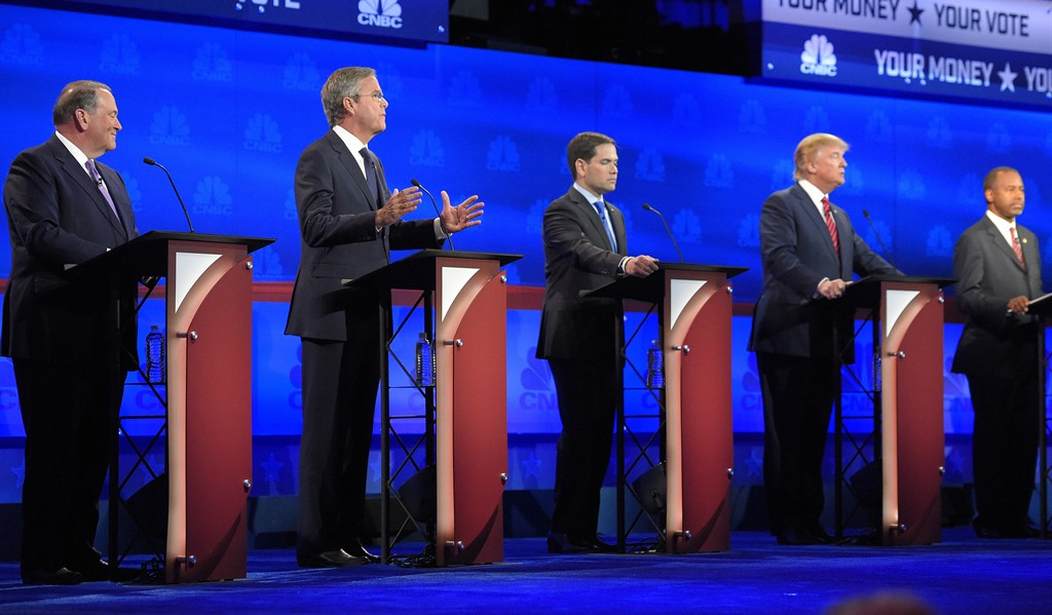Instead of voters being able to assess candidates' positions and discern differences on policy, the format turns into a personality contest, which may explain why Donald Trump and Ben Carson are still leading in the polls. And the CNBC moderators fell right into the trap early on. Carl Quintanilla's opening question was, "What is your biggest weakness?" It was a ridiculous way to start the debate -- and the questions didn't get that much better as the evening progressed.
The presidential debates were a disaster for Republicans in 2012, allowing such candidates as Herman Cain to capture the spotlight based on personality alone. This cycle, a large part of the Republican base is split between those who favor the bombastic extrovert Trump and those who favor the soft-spoken introvert Carson. If substance and actual positions on issues were the criteria, neither man would survive (and ultimately, I'm betting that neither will). In the meantime, undecided voters aren't getting a chance to examine where the candidates stand on issues, which is supposed to be the purpose of debates in the first place.
The next debate will take place in Milwaukee on Nov. 10. It will air on Fox Business Channel and will be co-sponsored by The Wall Street Journal. Ostensibly, the debate will focus on economic issues (which the CNBC one was supposed to do, as well, but didn't), with Fox hosts Neil Cavuto and Maria Bartiromo along with WSJ Editor-in-Chief Gerard Baker. The rules will allow any candidate who polls above 2.5 percent to participate; that is a low bar that serves no one's interest but the fringe candidates'.
Recommended
If the bar were raised to 5 percent, we'd have a real chance of seeing an actual debate, though it might mean Chris Christie, John Kasich, Rand Paul and Mike Huckabee would be absent unless their numbers were to improve over the next week. Even Jeb Bush and Carly Fiorina might fall off, which would be a disaster for Bush. But it might force him to make a decision about whether to continue his race, which has sucked up a lot of money that might be better redirected to a candidate who can inspire voters; yes, I'm thinking Marco Rubio. As for Fiorina, she'd still be in the mix for a place on the ticket if she were to fall back down to the secondary debate, as would Christie and Kasich.
If the debate narrowed to Trump, Carson, Rubio and Cruz, voters would have a chance to see who best represents the party. Trump's bombast would become a sideshow. Carson would show just how out of his depth he is in the world of policy and governance. Rubio would continue to show his command of issues but have to face tough questions (if moderators are capable of asking them) on his economic policies. And Cruz could demonstrate whether he is more than a skillful debater and actually capable of attracting voters.
All of this would require that candidates now in the race put the party's chances of winning the White House in 2016 above their own personal ambitions. It's a tall order. But there was a time, long past, when politicians were in it for the sake of something bigger than themselves. Looking at this year's slate of GOP hopefuls, it seems that some are in it to boost speaking fees and book deals or simply to aggrandize their already outsize egos. Others, such as Bush, Kasich and Christie, know they'd make a good chief executive; they've proved that as governors. But at some point, each of them must realize that in order to get to the White House, you have to win over voters, and they aren't doing a good job of that right now.
Maybe the best solution would be to put the debates on hiatus until after the first primaries. At least that way, the candidates could spend their time focusing on actual elections. Eight more debates -- two of them in 2015 -- are too many. By increasing the number of debates and vastly expanding the numbers of participants, we've diminished the value of debates to those who matter: the voters.

























Join the conversation as a VIP Member